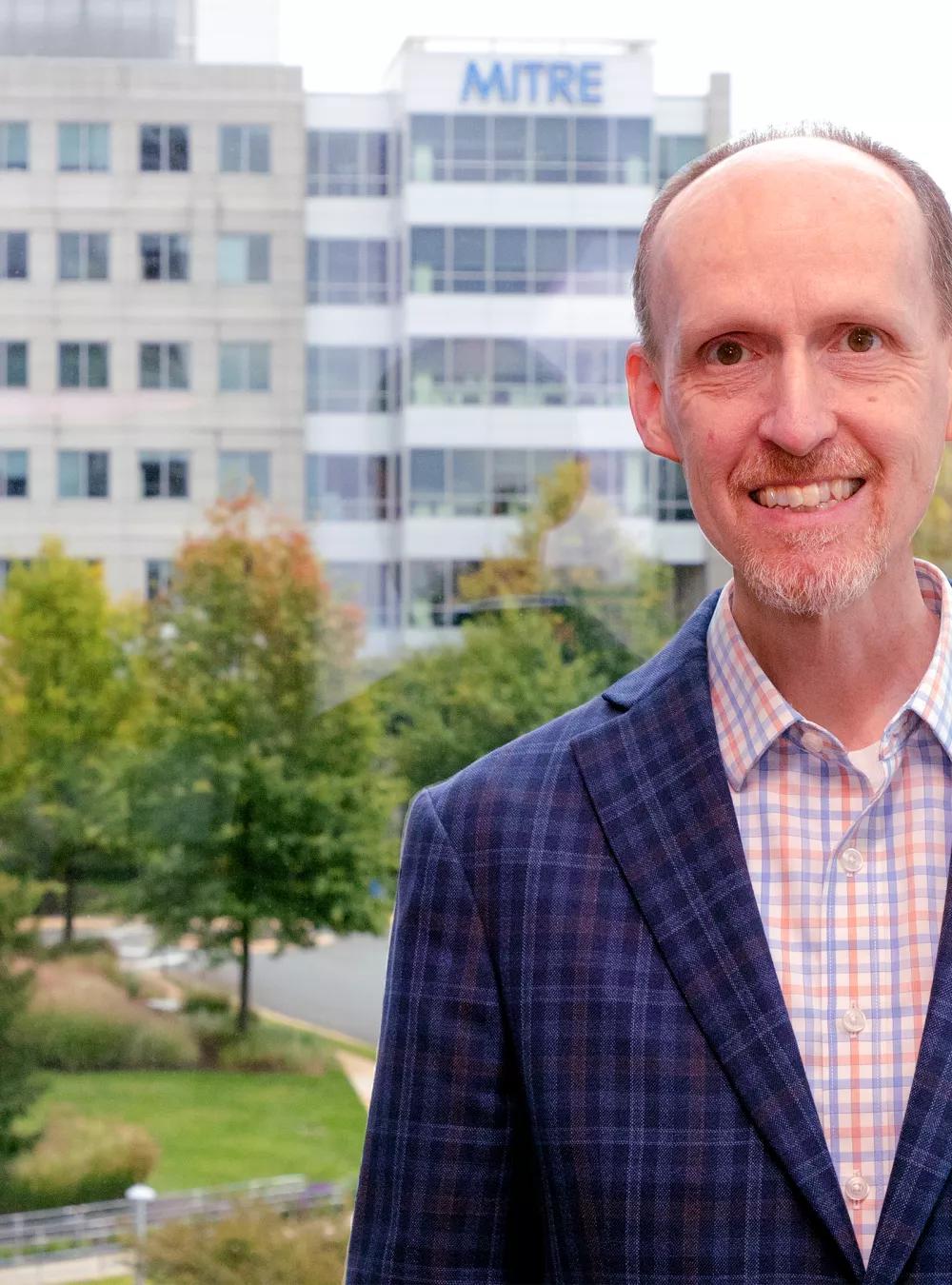Jared Banks, Center for Data-Driven Policy and Center for Strategic Competition

Ever the Diplomat, Jared Banks Brings Deep Policy Experience to MITRE's Mission
A keyword scan on Jared Banks' resume would produce dizzying results: human rights, international narcotics, refugee migration, pandemic preparedness, clean energy, entrepreneurship, agricultural research, physics, digital assets, multilateral engagement, artificial intelligence, maritime security.
Despite such breadth, Banks says for much of his two decades of government service, colleagues referred to him as a "science and tech guy." He didn’t object. Then, in January, he joined MITRE.
The depth of technical expertise he encountered blew him away—"everything from high-level systems engineering to quantum sensing of microelectronics—things with super-important national security implications," he says. "And it became crystal clear: at MITRE, I'm definitely a policy guy, but with an understanding of the role of science and technology [S&T] in strategic competition and geopolitics."
The combination makes Banks a natural fit in our Center for Strategic Competition and Center for Data-driven Policy. Here less than a year, he's already contributed that unique lens to several critical emerging-technology projects and the center's presidential transition papers.
At MITRE, I'm definitely a policy guy, but with an understanding of the role of science and technology in strategic competition and geopolitics.
The Human Face of Policy
The former diplomat is very comfortable in the space between policy and S&T. He didn't always imagine himself operating at that intersection.
Originally, pursuing his Ph.D. in African Cultural Studies from University of Wisconsin-Madison, Banks planned to teach. "But the longer I was in program, the clearer it became that I wanted more action instead of academia—the frontlines of international affairs instead of the classroom."
After completing his degree, he moved to Washington, D.C. and became a Presidential Management Fellow. Initially part of the Office of International Affairs of the Immigration and Naturalization Service (now Department of Homeland Security), Banks soon transitioned to the U.S. State Department as a Foreign Service Officer. He rotated between D.C. and overseas assignments, including to Brazil, Poland, Afghanistan, Switzerland, and the United Kingdom.
The first half of his State Department career centered on human rights. With two tours at the U.S. Embassy Kabul in Afghanistan, he worked extensively with international organizations, including the United Nations, the North Atlantic Treaty Organization, and the European Union. And as the embassy's Human Rights Chief, he got to see the human faces behind his work.
For example, "seeing a woman in Afghanistan who's vocal, standing up for her rights, running for office, protesting—it's inspiring," Banks says.
"I once met with an Afghan parliamentarian soon after she was released from the hospital. The Taliban had attacked her convoy and seriously injured her," he explains. "She came to the embassy in a wheelchair. And she was absolutely undeterred. I encountered many women like her—some of the most incredibly brave people I've ever met."
Along the way, Banks also found his interest piqued about how technology can impact people's lives. That's when he shifted focus to the geopolitics of S&T challenges and opportunities around the world.
Hitting the Ground Running
Much as Banks loved these global experiences, when retirement eligibility rolled around, he began considering options that would allow him to stay closer to home and family.
MITRE has worked with the State Department for over 10 years, and Banks had crossed paths with our teams several times during his tenure there. He figured our not-for-profit mission could be a good opportunity to continue doing international work in the public interest, with better work-life balance. The assessment proved true.
"Here I can work on the same mission with State and other interagency partners, surrounded by deep technical expertise," he says. "As operator of six FFRDCs with a diverse range of sponsors, MITRE has visibility across the government. We can develop capabilities to address one sponsor's problems that are also relevant for other sponsors."
He's particularly impressed by the company's work in cybersecurity and protecting government systems, an area that's stretched his policy-expertise muscles.
Banks coordinated and co-authored MITRE’s presidential transition paper, "Don’t Trust But Verify: Strengthening U.S. Leadership to Safeguard Our Cyber Defense." The effort details recommendations to protect and secure critical infrastructure and government operations.
"I got to consult with dozens of experts across the company who work both the risks and standards-development aspects, as well as interagency operations, the private sector, and critical infrastructure," he says. "We worked together to synthesize these and convey the urgency around this, to address both domestic needs and geopolitical risks."
Though Banks enjoys these kinds of complex challenges at work, in his off time, he appreciates simpler activities. From hiking to gardening to other outdoor tasks, "I like feeling the sun on my face, getting my hands dirty, being connected to the ground."
Join our community of innovators, learners, knowledge-sharers, and risk takers. View our Job Openings and Student Programs. Subscribe to our MITRE 360 Newsletter.